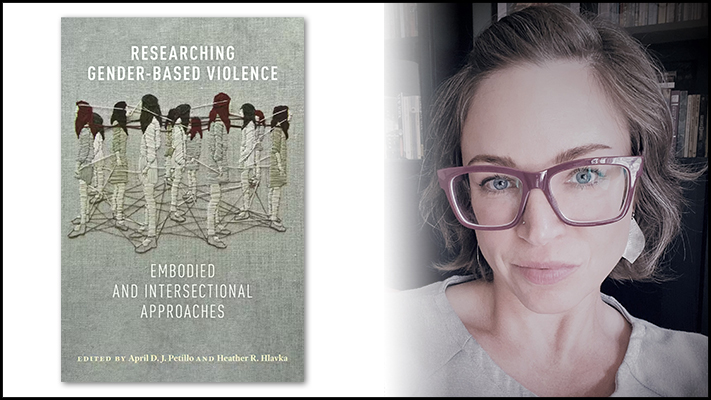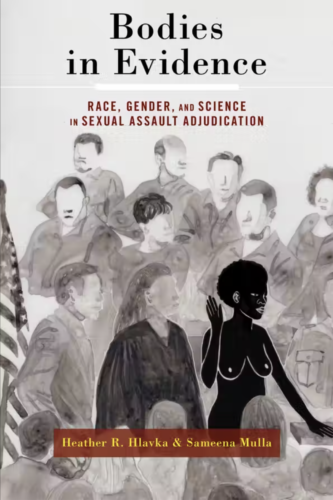Co-edited by Dr. Heather R. Hlavka, associate professor of social and cultural sciences, Klingler College of Arts and Sciences

“Researching Gender-Based Violence” argues for new approaches to research and activism on gender-based violence grounded in the intersectional realities of individuals and communities. Each chapter discusses the role of reflective methodologies to recognize institutional and intersectional inequalities, challenging the reader to contemplate ethical considerations of an embodied feminist methodology when researching gender-based violence. By centering these issues for applied scholars, practitioners, and academic activists, the book offers insights about where sociocultural notions of criminality and innocence might align across geographies of gender-based violence.
Learn more or purchase this book at NYU Press
Dr. Hlavka answered some questions about her new book, including her favorite part of the writing process, what she hopes the book can accomplish and how it complements her teaching and research work.
This book is an interdisciplinary collection of critical, feminist reflections on researching and living gender violence that challenges readers to embrace an embodied feminist methodology in research, activism and practice.
My favorite part of writing and editing this collective volume was working with, learning, listening and experiencing the feminist friendships that take root in research, activism and practice. The process for contributors and editors was deeply organic, collaborative and empowering – the way gender-based research can be, but unfortunately oftentimes is experienced as disempowering and alienating in our institutions and the academy. I was proud to work on this volume with my co-editor, April D.J. Petillo, who shared the beauty of this embodied and entangled work with me, and through reflection and sharing, to grow in my own commitments and understanding intersectional feminism with all the contributors.
The genesis of this collection evolved from several years of organic conversations and connections over workgroups, conference presentations and roundtables with gender violence researchers, activists and practitioners. These workshops were often replete with scholars engaged in gendered violence research, longing for conversations on how to weave together the affective and intellectual in methodological practice, and how to harness the relationships, the material conditions, the intersubjective experiences, and imposed limitations and violences of our institutions. Together, the editors and contributors expose a wider dialogue on doing and experiencing gender-based violence research from a mix of critical methodologies across multiple disciplines, social positions and experiences.

My first book, “Bodies in Evidence: Race, Gender, and Science in Sexual Assault Adjudication” (with former Marquette faculty, Dr. Sameena Mulla) was published by NYU Press in November 2021. My work on interpersonal and state trauma, young people’s experiences of sexual violence, science and technology, and feminist research ethics have been published in journals such as “Gender & Society,” “Violence Against Women,” “Men & Masculinities,” “Law and Social Inquiry,” “Law & Society Review,” “The Gender Policy Report,” and popular media and on public radio.
“Bodies in Evidence” was previously featured in the Marquette Bookshelf in November 2021 when the book was published.
The co-editors and contributors hope to fill a void in literature by bringing together inter- and cross-disciplinary perspectives on the intersectional and embodied realities of feminist research and practice on gender-based violence. Thus, we honestly and openly address methodological challenges in feminist research, deconstructing cultural tropes and notions of violence on both structural and intimate levels and query the practice of research and the production of knowledge. In doing so, contributors speak to doing and writing intersectional, collaborative, and embodied research, identities and affective trauma by researchers and their interlocutors, and how to “write against the hierarchy” of these identities and positions. This collection invites the reader into frank discussions and reflections on lessons learned, and mistakes made, while grappling with gender-based violence across geographies, modalities and intersectional realities. Contributors argue for interpersonal methodological approaches to research and activism that are firmly grounded in the intersectional realities for individuals, communities and researchers while recognizing that these three positions are hardly ever discrete.
I am a feminist sociologist and interdisciplinary scholar, and my research on gender violence and intersectionality began as a first-gen college student and activist at the University of Minnesota. I have over two decades of sexual violence advocacy experience including crisis-line response, group facilitation and education, and campus services. I teach undergraduate courses at Marquette including research methodology, sexual violence, youth justice and transformative justice. I also have a collaborative chapter in “Researching Gender-Based Violence” with many former Marquette colleague Sameena Mulla and Marquette graduate and McNair scholar, Amber Joy Powell. In that chapter, we link together our joint ethnographic work in the Milwaukee Country courts published in my first book, “Bodies in Evidence” and the embodied, intersectional experiences of team research and writing. Like my teaching, my research is collaborative and community-led focusing on sexual violence, state violence, and embodied gender trauma and empowerment.
This is an edited collection – one of the chapter authors is Dr. Noelle Brigden, associate professor of political science at Marquette. The Institute for Women’s Leadership at Marquette also helped provide needed funding for indexing the collection.
If you have recently published a book, or if you have one coming out, we would like to feature your publication in an upcoming Marquette Bookshelf feature. More information on the submission process is available online.
Book Details
- Publisher: NYU Press (Aug. 2, 2022)
- Language: English
- Paperback: 216 pages
- ISBN-10: 147981220X
- ISBN-13: 978-1479812202



